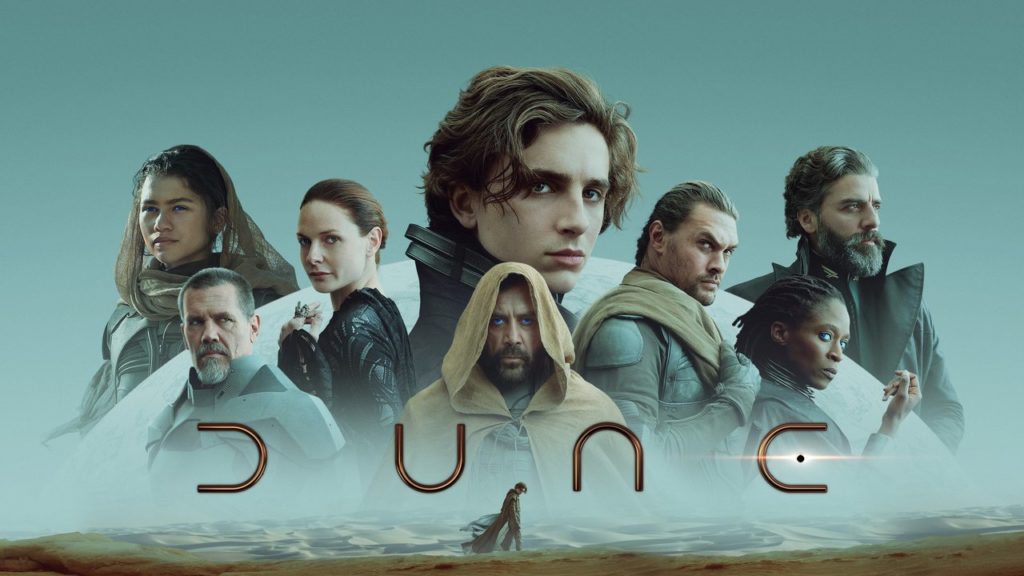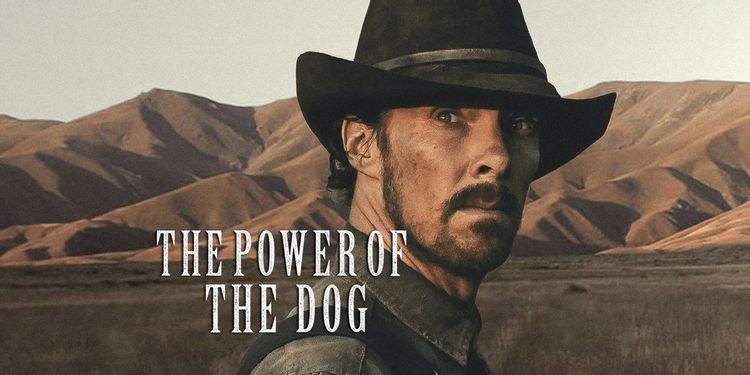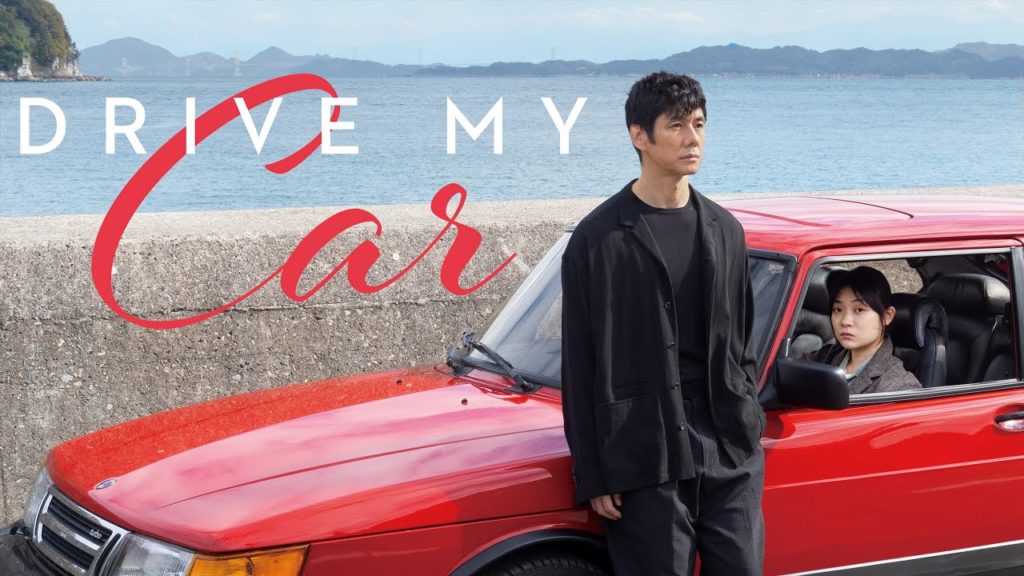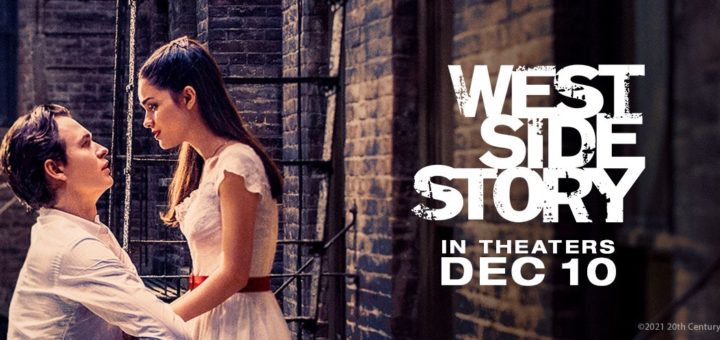#5. Lawrence of Tatooine
This one’s very good but also came very close to being my worst viewing experience of 2021. Okay second worst, I did have to rewatch The English Patient last year.
A whole bunch of space opera concepts get hurled at us but the basics are that the planet Arrakis is home to something called the Spice, without which faster than light travel is the fever dream of a madman. The Emperor takes control of Arrakis away from the cruel House Harkonnen and gives it to the more noble House Atreides, but this turns out to be a trap. The Emperor only gave Arrakis to House Atreides so they’d be wiped out when the Harkonnens inevitably violently retook the planet. It’s up to heir apparent Paul Atreides to rally support from the Arrakis natives to fight back… later. Not in this movie.
Which is the main and possibly only issue I have with Dune. It’s all set-up, zero payoff, all payoff is reserved for Part 2 which hadn’t been greenlit at time of release, so it’s still something like two years away, stupidly isn’t called Twune, and without it this movie would be unsatisfying to the point of being unwatchable. I rolled the dice and saw it in IMAX and have no regrets but still.
When a bunch of Marvel fans who promised us they aren’t racist at all you guys were shouting that Avengers: Infinity War deserved a Best Picture nomination more than Black Panther, one of my counter arguments (other than “Seriously?”) was that Infinity War was half a story. No matter how much Kevin Feige protests that it isn’t, the whole thing screamed “To Be Continued.” And yet it still had a slightly more closure than Dune, which barely makes it past the larger story’s inciting incident. So I feel I should dock it points for that. But on the other hand, The Fellowship of the Rings didn’t end with closure either, and I love that one a lot, so… yeah, I’m good with Dune. Because it’s visually spectacular, the mammoth, all-star cast is all great, and they managed to burn through a lot of space opera nonsense world-building and really invest me in Paul’s efforts. They could still trip over their feet in part two, but Dune’s got my interest so far, and if part two’s this good, it’s a triumph.
Until then this one’s getting ranked lower than it earned because it’s incomplete and the sequel could be worse, we don’t know.
Where would I rank it? Under the actual Lawrence of Arabia at 29. Unless the sequel’s not good in which case it’s gonna take a tumble.
But why not…? Okay gonna take a break from films and ask the question… how is it that Dune is nominated for nine Oscars, including Best Picture, but not Best Director for Denis Villeneuve? You think those seven technical award nominations happened because the designers went rogue and answered to no one? You’re going to look me in the eye and tell me you think Belfast was better directed because, what, it’s in black and white mostly? Jesus Christ.
#4. Fishing For Your Heartstrings
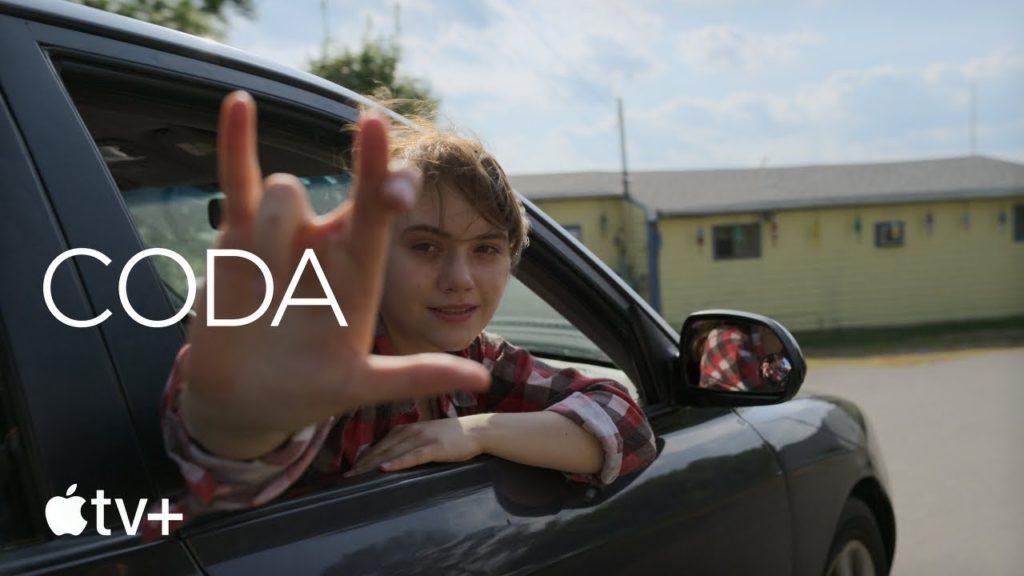
Image: Apple
Ruby Rossi (Locke and Key’s Emilia Jones in a big breakout role) is a Child Of Deaf Adults, or “Title Of The Movie,” raised by a third (at least) generation fisherman and his ex-model wife (deaf icon Marlee Matlin), and is the only member of her family of four who can hear. On a whim, she follows a cute boy into joining her school choir, where her teacher discovers what her family never could: she’s a gifted singer, perhaps worthy of Berklee College of Music. But going away to college (slightly away, still in Massachusetts) would mean she could no longer act as her family’s interpreter with the hearing world, something they need more than ever as her father and brother attempt to organize a co-op with the other fishermen to cut out the middleman gradually bankrupting them.
Look this isn’t a particularly new story. Family expects A, child’s true passion is B, A and B inevitably find themselves at loggerheads, typically B wins out because we long since moved past the idea that it’s the new generation’s inherent responsibility to take over the ranch or the mill or the smithy or whatever. So it comes down to execution, and the execution on this one was pretty damn good.
The cast is great, from Jones and Matlin to Best Supporting Actor favourite Troy Kotsur’s passionate performance as Ruby’s father, to Daniel Durant as her older brother Leo who feels it’s his responsibility to save the family business, not hers. They successfully raise the stakes so that when we reach the low moment where Ruby is ready to abandon her dreams to serve the family, it lands as maybe the right choice. The mean ol’ Government doesn’t actually look into the camera and say “You can’t fish unless your daughter abandons her dreams for you” but it’s not far from that.
Which really leads to my one main problem with this movie. Leo’s arc is that he feels that as first born it’s his job to keep the family business going, so Ruby shouldn’t have to give up her dreams to do it instead. Part compassion for Ruby, definitely part ego, but it states that just because the other Rossis are deaf doesn’t mean they can’t function in society. A good story with a good message. But… we never see Leo step up to save the business. The family just… figures stuff out off-camera. One day Ruby’s all that stands between her family and bankruptcy, the next they practically drag her to her college audition, and then all is well. Her new boyfriend takes her place on the boat for, I dunno, college credit question mark, and everything just works out. Raising the stakes beyond “Her family finds her leaving to be inconvenient” is good and important, but the higher the stakes the more you need a strong resolution and we’re missing that here.
Two scenes work especially well for me, though. What would normally be Ruby’s big Triumph Moment, her featured duet at the choir concert, is not that. As she and her romantic interest start singing their love song, the audio fades out, and we witness it from Ruby’s father’s perspective. He can’t hear the song, he can’t know Ruby’s talent directly, but he can see the effect she’s having on the crowd. And after, when she’s ready to give up singing, her father asks her to sing it again, feeling the vibrations from her vocal chords as she does, getting caught in her emotions as the lyrics of “You’re All That I Need to Get By” go from romantic to symbolizing the chains holding her on the boat. Powerful moment, and my only note is that both actors in this moment maybe needed Oscar nominations, though Troy Kotsur surely earned his.
It’s predictable, it’s a little formulaic, but it lands.
Where would I rank it? If it were to repeat its victory at the SAG Awards (unlikely, it only managed three Oscar nominations total, that’s quite the underdog), it would be a couple spots under the ultimate Oscar Comfort Movie, Going My Way, at #42, between Rebecca and The Artist.
But why not…? At time of writing I haven’t seen it myself but just try finding anyone who’s seen Pig and doesn’t think it’s a surprise masterpiece and Nicholas Cage’s best work.
#3. P-P-P-Puppy P-P-P-Power
Brothers Phil and George Burbank run a cattle ranch in 1925 Montana. Quiet George is the businessman, still keeping his east coast big city wardrobe and general vibe, while Phil has thrown himself into the rancher life, modelling himself after his cowboy mentor, the late Bronco Henry, whose saddle Phil keeps as a treasured idol. While taking a herd to market, the rough and cruel Phil upsets single mother waitress Rose by mocking her quiet, academic son Peter. George feels bad for Rose… so bad that he ends up marrying her and bringing her home to the ranch. Also her son, while he’s on break from med school. Phil does not care for this arrangement, subtly bullying Rose and at first Peter… but he and Peter begin to bond. Is this genuine closeness, or is a predator circling his prey? Does Phil see Peter as a protégé or threat?
I think this one rises above most just because it’s so much more subtle and nuanced. There’s more to unpack. It takes a pleasant amount of time to digest the hints and allegations that events of the last act bring to light, implications that Bronco Henry might not quite have been the John Wayne/conservative wet dream icon Phil claims. And that’s more than you can say about King Richard, Don’t Look Up, or even West Side Story, where everything’s on the surface and very blatant. (Dune might find time for nuance in part two, when the story gets out of second gear.)
(Let’s pause to consider that “contains nuance” got it this high on the list, that’s where we’re at with this year’s crop.)
The performances are strong across the board… even Benedict Cumberbatch’s usually shaky American accent is working, and hey, Thomasin McKenzie is in it! Not for long and she doesn’t do much but I imagine she was stuck in New Zealand for COVID times anyway and Jane Campion called so what was she gonna do, turn it down?
It has a lot to (subtly) say about toxic masculinity… male characters trying too hard to be one thing to avoid scary truths about really being a different thing, power plays between the men of the family, few are what they seem at first. And New Zealand is looking pretty great in its role as “Montana.”
It’s interesting and didn’t go where I thought or feared it might. I won’t be too mad if the initial buzz is right and this one wins.
Where would I rank it? Up with the other western designed to challenge you and your expectations, Unforgiven, at #40. But still under Rain Man.
But why not…? The Power of the Dog has some pretty shots but there is some sheer artistry in the filming of Edgar Wright’s Last Night in Soho. A sinister ghost story with some clever twists and turns and great performances from Thomasin McKenzie, Anya Taylor-Joy, a creepy Matt Smith, Dame Diana Rigg, and Terrence Stamp. She hasn’t been in enough movies (or enough movies that aren’t Old) for “Quantity of Thomasin McKenzie” to be a reliable metric of film quality but… just saying, there’s much more Thomasin on this one, and Anya Taylor-Joy, that ain’t nothing.
#2. 悲しみにマリネする
Theatre actor/director Yûsuke Kafuku and his TV writer wife, Oto, have a mostly content life with an undercurrent of sadness. The death of their young daughter many years ago is a wound that never fully healed, and Oto’s infidelities suggest to Yûsuke that maybe she’s not completely happy with him. Yûsuke’s primary comfort is driving through the city, listening to a tape of Oto reading the dialogue from his current play (at this point, Uncle Vanya) so he can run his lines. Before they can discuss the affairs, or whatever topic caused Oto to ominously state “Can we talk later,” Oto suffers a cerebral hemorrhage while he’s driving and dies soon after.
That’s not the movie. That’s the prologue. That’s what happens prior to the opening credits. That said, the opening credits are forty-one minutes into the movie, welcome to Drive My Car, strap in.
Two years later, Yûsuke travels to Hiroshima to direct a multi-lingual production of Uncle Vanya in a festival, surprising everyone by not reprising the lead role. He can’t. His grief and guilt make it too hard to fall that deep into character. Instead, he ends up casting someone he isn’t glad to see… Oto’s final lover, Koshi Takatsuki, a TV actor haunted by scandal and also grief for Oto. And to top things off, for the festival’s insurance purposes, he can’t drive himself anymore, instead turning the keys over to taciturn Misaki Watari, a woman imprisoned by her own complicated grief and guilt. Together, the three begin to confront the pain that has come to define their lives.
Remember when I praised Power of the Dog for possessing nuance? Everything in Drive My Car is powerfully nuanced. At first glance it might seem slow and lacking in content, but a viewer paying attention will see an ocean of story and emotion constantly happening beneath the surface. I didn’t want to look away because every scene of long drives or emotionless readthroughs of Uncle Vanya* is packed with meaning and inference to those even slightly trying to see it. And it builds to powerful, bittersweet catharsis, as Yûsuke and Misaki finally openly acknowledge the sources of their pain and maybe, maybe, find a path forward.
It’s nearly three hours long and I won’t pretend it never feels like it. Seriously, Forty. One. Minutes. To the opening credits***. But I can’t imagine a scene I’d cut, a moment I’d accelerate. As a treatise on grief, it’s incredibly effective.
More effective than Manchester By the Sea ever was sorry, sorry, that was unneeded, I just couldn’t keep it in…
(*When your cast speak like minimum four languages** you need to spend some time letting them figure out what everyone else’s lines sound like)
(**One of the cast is mute and speaks Korean sign language. Between this, CODA, Makkari in Eternals, and Maya/Echo in Hawkeye, and even a little bit Dune, sign language is really having a moment lately, good for it)
(***Man, the Oscars liked a giant prologue this year, between this, Nightmare Alley, and Dune, which was just a feature length prologue.)
Where would I rank it? If this one pulls a Parasite upset and reminds Hollywood that the real work in innovating film is happening overseas while Hollywood sits around savagely overvaluing King Richard, this one would nestle in at #35, under Midnight Cowboy but over One Flew Over the Cuckoo’s Nest.
But why not…? I may not have seen enough movies (well, recent movies) this year to keep this bit going… again, at time of writing I haven’t seen this one, but every voice on film I trust says The Last Duel belongs in this conversation.
#1.Singing, Dancing, Spielberg
You know this one. Tony, former member of the all-white gang the Jets, meets Maria, sister of rival Puerto Rican gang the Sharks’ leader Bernardo. Tony and Maria fall quickly and deeply in love while the two gangs prepare for one big ill-fated rumble and it’s Romeo and Juliet, let’s proceed.
This isn’t the first time a Best Picture winner has been remade, but it’s one of only two times that a Best Picture Winner was remade and ended up a legit Best Picture contender again. (The other being the third and fourth attempts at Mutiny on the Bounty.) But that’s Spielberg. He barely knows how to make a bad movie (insert your own Ready Player One joke here).
The new book (the parts of a musical script where nobody’s singing) from Angels in America writer Tony Kushner (who worked with Spielberg on Lincoln and Munich) works great, heightens the racial tensions, and makes the Jets a little more menacing than the ’61 version managed. The songs are slightly shuffled and placed in other contexts which helps a few hit harder and gives “I Feel Pretty” an ominous dramatic irony. And the songs still work, especially “America” (still slaps hard) and anything they give to Rachel Zegler, who’s an incredible talent. The amount of neighbourhood being bulldozed to be Fancy Modern Manhattan also adds so much; the Jets and Sharks are fighting for a world that’s collapsing around them.
Some might question Spielberg’s decision to have the Puerto Rican characters slip in and out of Spanish (because of course they speak Spanish, it’s their first language) and not bother to subtitle it. I was fine with it. If you don’t speak Spanish, you can follow what they’re saying through context clues if you’re paying attention, and I respect Spielberg’s view that subtitling the Spanish is diminishing the latinx characters. In his words, “If I subtitled the Spanish I’d simply be doubling down on the English and giving English the power over the Spanish. This was not going to happen in this film, I needed to respect the language enough not to subtitle it.” It’s not a common Hollywood choice but I’m not here to question it.
Also now that it’s streaming my Twitter feed is packed with praise for the camera work, visual storytelling, the tour de force shots that Spielberg makes look effortless, and how Mike Faist deserved at the very least a nomination for Supporting Actor for his performance as Mercutio Riff.
It might not be new or original but it’s very well realized and despite being set in the 50s, still timely.
Where would I rank it? Better direction and no white actors browned up to play Puerto Ricans means it’s much higher than the ’61 version at 32, between Ordinary People and Moonlight.
But why not…? Okay you know what we’re doing this, we’re saying that maybe they should have kicked the tires on Tick Tick Boom again. Yes, sure, some of the songs aren’t great (what does the end song, “Louder Than Words,” actually have to do with anything), but Lin-Manuel Miranda’s direction is very clever, the story’s very well realized in places, Andrew Garfield is acting the hell out of this thing, and yeah it’s weird that Jonathan Larson’s actual life completely reversed the original play’s meaning (the moral seemed to be that Larson had to relax and stop seeing life as a ticking clock and man that did not turn out to be true, he was up against a tight deadline) but it was a good watch. Certainly less emotionally manipulative than King Richard.
And that’s my list! At least half of them weren’t a slog to get through at all, at least one of which I look forward to discussing on at least one of my current podcasts, and only some hollowed out your faith in the world being basically okay!
At time of writing, Power of the Dog remains the favourite, but getting shut out of the SAGs took the wind out of its sails a little, so who knows. Maybe Spielberg slips in and takes the crown once more. That’d be neat.
But if King Richard takes anything but lead actor, we riot.

